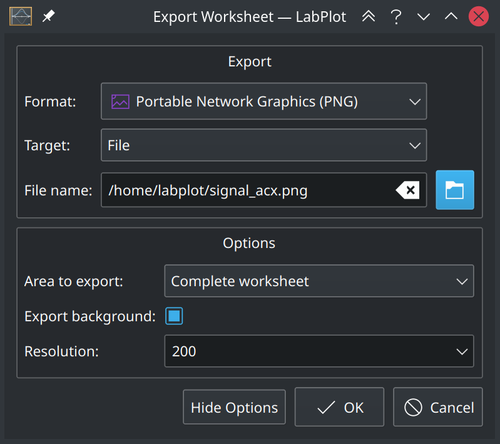LabPlot/GettingStarted/YourFirstDataImportVisualisation: Difference between revisions
No edit summary |
No edit summary |
||
| Line 2: | Line 2: | ||
== Create a new project == | == Create a new project == | ||
Create a new project by selecting "File/New" from the main menu: | |||
[[File:LabPlot Getting Started New Project.png|500px|thumb|center]] | [[File:LabPlot Getting Started New Project.png|500px|thumb|center]] | ||
Here and in the similar steps below, the action can also be triggered alternatively from the corresponding icon in the toolbar or from the context menu, if available. | |||
After the new project was created, you'll see [[Special:myLanguage/LabPlot/Interface/ProjectExplorer|Project Explorer]] showing the structure of the project as well as [[Special:myLanguage/LabPlot/Interface/PropertiesExplorer|Properties Explorer]] showing the properties of the currently selected object in the project explorer. The project is empty yet and we're going to add some more content to it now. | After the new project was created, you'll see [[Special:myLanguage/LabPlot/Interface/ProjectExplorer|Project Explorer]] showing the structure of the project as well as [[Special:myLanguage/LabPlot/Interface/PropertiesExplorer|Properties Explorer]] showing the properties of the currently selected object in the project explorer. The project is empty yet and we're going to add some more content to it now. | ||
== Create a new spreadsheet == | == Create a new spreadsheet == | ||
The data is organized and stored in LabPlot in [[Special:myLanguage/LabPlot/DataContainers|Data Containers]]. For the data we want to import and visualize in this example we're dealing with the data organized in columns (one variable | The data is organized and stored in LabPlot in [[Special:myLanguage/LabPlot/DataContainers|Data Containers]]. For the data we want to import and visualize in this example we're dealing with the data organized in columns (one column per variable) in the original source file. [[Special:myLanguage/LabPlot/DataContainers/Spreadsheet|Spreadsheet]] is the appropriate data container to import such data into. To create a new spreadsheet, select from the context menu in the project explorer "Add New/Spreadsheet": | ||
[[File:LabPlot Getting Started New Spreadsheet.png|500px|thumb|center]] | [[File:LabPlot Getting Started New Spreadsheet.png|500px|thumb|center]] | ||
| Line 34: | Line 34: | ||
The imported data contains signals from multiple sensors that were placed on a multicopter. We want to visualize the acceleration in the x-direction. For this we select the column containing this data and select "Plot Data/xy-curve" from the context menu of this column: | The imported data contains signals from multiple sensors that were placed on a multicopter. We want to visualize the acceleration in the x-direction. For this we select the column containing this data and select "Plot Data/xy-curve" from the context menu of this column: | ||
[[File:LabPlot Getting Started Plot Data.png|500px|thumb|center]] | [[File:LabPlot Getting Started Plot Data.png|500px|thumb|center]] | ||
The "Plot Data" Dialog will appear: | The "Plot Spreadsheet Data" Dialog will appear: | ||
[[File:LabPlot Getting Started Plot Data Dialog.png|500px|thumb|center]] | [[File:LabPlot Getting Started Plot Data Dialog.png|500px|thumb|center]] | ||
Revision as of 13:11, 1 May 2021
Import of the data and its visualization can be achieved with a couple of mouse clicks in LabPlot:
Create a new project
Create a new project by selecting "File/New" from the main menu:
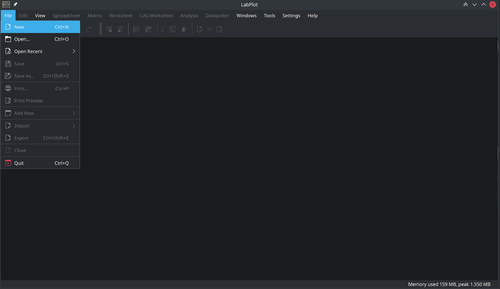
Here and in the similar steps below, the action can also be triggered alternatively from the corresponding icon in the toolbar or from the context menu, if available.
After the new project was created, you'll see Project Explorer showing the structure of the project as well as Properties Explorer showing the properties of the currently selected object in the project explorer. The project is empty yet and we're going to add some more content to it now.
Create a new spreadsheet
The data is organized and stored in LabPlot in Data Containers. For the data we want to import and visualize in this example we're dealing with the data organized in columns (one column per variable) in the original source file. Spreadsheet is the appropriate data container to import such data into. To create a new spreadsheet, select from the context menu in the project explorer "Add New/Spreadsheet":
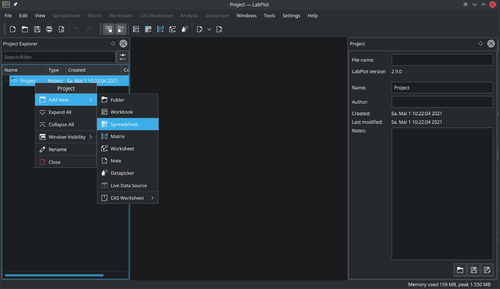
You'll get a new spreadsheet created with its default settings:
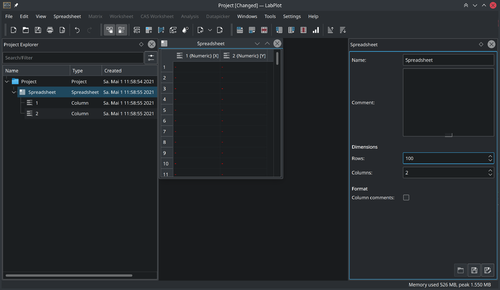
We're prepared now to import the data into this new spreadsheet.
Import data
To import the data from an external file select "Import from File" in the main menu:
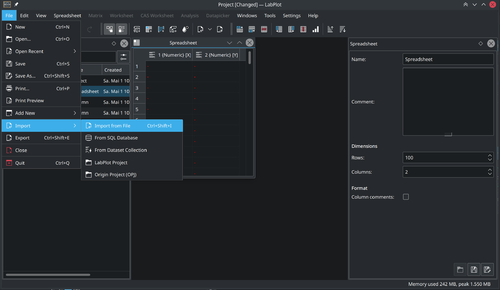
In the "Import File" Dialog, specify the location of the file to be imported and the settings for the import like the separating character, etc.:
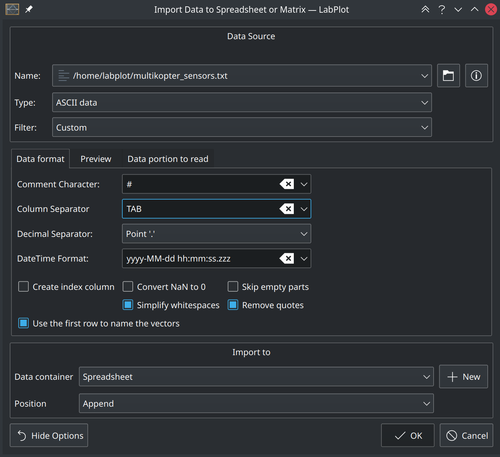
Navigate to the "Preview" tab in this dialog to check whether the structure of the data will be properly read with the current settings:
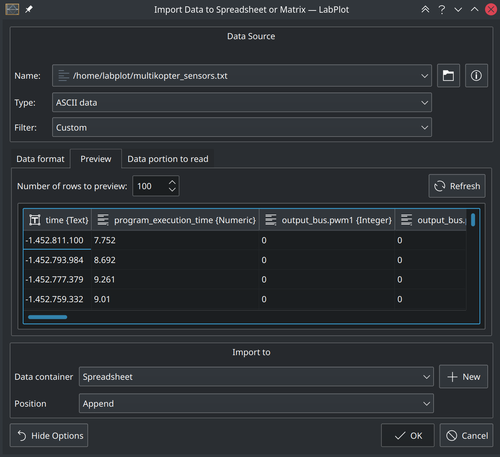
Click on the Ok-button to import the data into the spreadsheet. After the import you'll see your data in the spreadsheet:
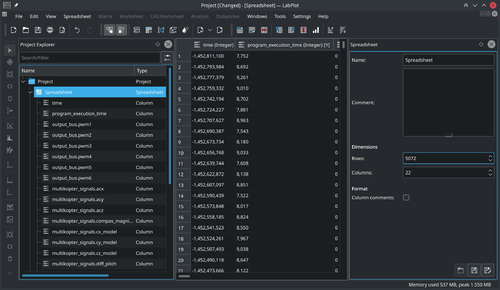
Visualize data
The imported data contains signals from multiple sensors that were placed on a multicopter. We want to visualize the acceleration in the x-direction. For this we select the column containing this data and select "Plot Data/xy-curve" from the context menu of this column:
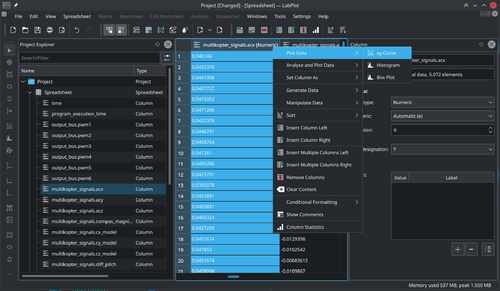
The "Plot Spreadsheet Data" Dialog will appear:
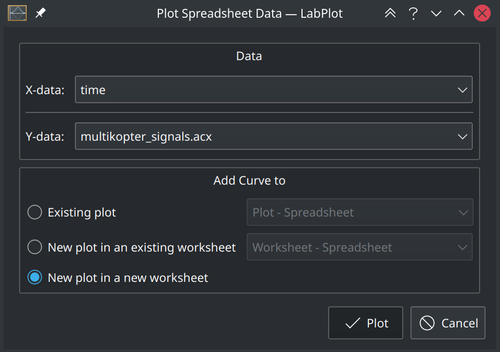
LabPlot automatically recognized the column "Time" that will be used for x. We keep all the other setting as shown on this screenshot to visualize the data in a new plot on a new Worksheet:
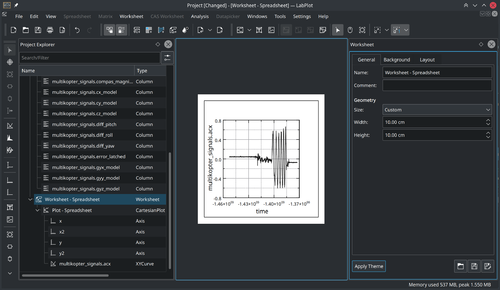
Once the plot is created you can modify its appearance by clicking on the plot or one of its children and modifying the properties in the properties explorer.
Export results
To export the produced plot, click on the Export button and specify the location of the file and its format:
